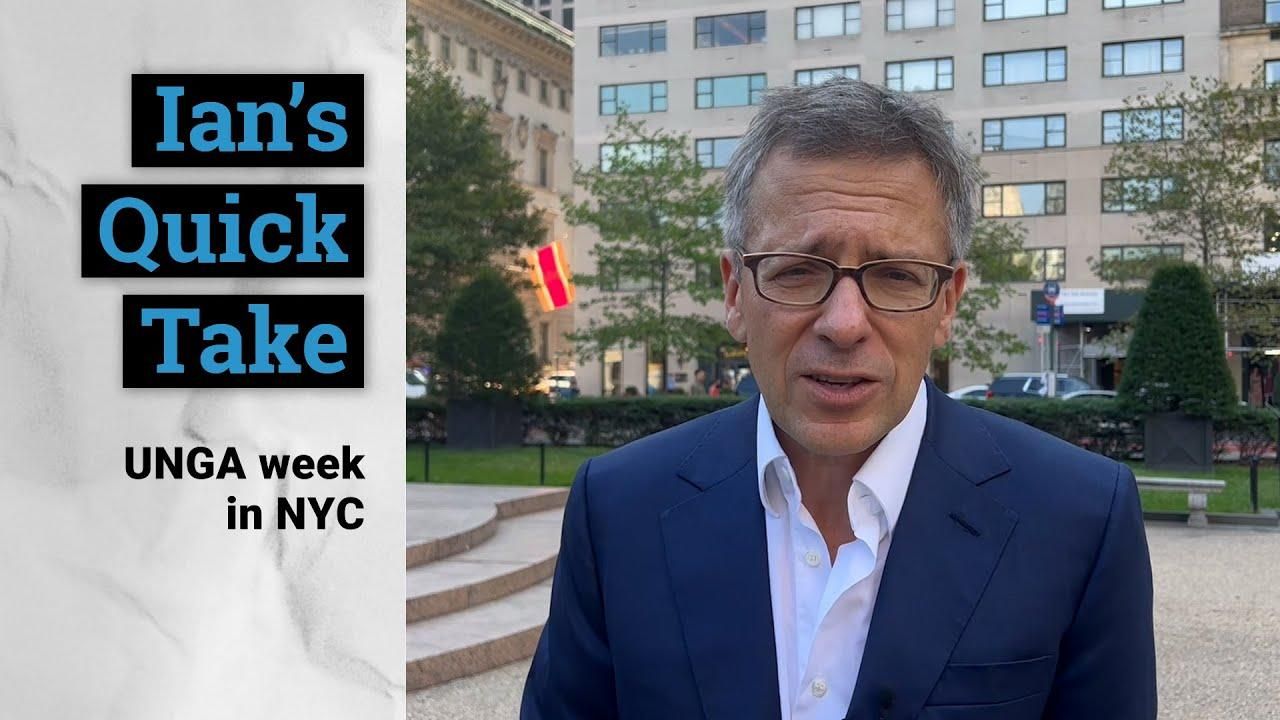Quick Take
A world of knock-on challenges as global leaders meet. Will UNGA act?

A World Of Knock-On Challenges As Global Leaders Meet. Will They Act? | Quick Take | GZERO Media

Ian Bremmer's Quick Take: Hi everybody. Ian Bremmer here from a glorious New York City, as it always is this time of year, late summer, early fall. But my God, of course, we also have a very busy New York City because thousands of diplomats from all over the world are all coming here to Midtown, to the East River, to the United Nations, to kick off UN General Assembly week, UNGA, they call it. You don't want to drive. I mean, the traffic is absolutely insane. You want to walk as I usually do. Take the subway to get around at all.
What's going on this week? What's actually happening? It is a relatively negative environment, frankly, in part, because of the land war that's happening in Ukraine and all of the knock-on economic challenges. But in part, because more broadly, so much of what is on the United Nations agenda is not where the world is presently heading. This morning, the UN put out their Human Development Report, something they do every year. And frankly, the direction on things like education, where hundreds of millions of people because of the pandemic are now facing challenges in basic developments, where over 20 million that left school during the last two years are not expected to ever go back. Higher numbers of forced migration because of conflicts in the Middle East, and Africa, and in Europe. Significant, of course, climate impact. We, right now, still have almost a third of Pakistan underwater with tens of millions having been displaced.
These are issues that are fundamental to the UN agenda. And for 50 years, you still saw, even though there were big challenges coming for the world, human development was actually improving. A global middle class was emerging. Global extreme poverty was being reduced. We can't say that right now. And there's an absence of leadership on the global stage to try to respond. Why? Because so many countries are focused, understandably, first and foremost, on populations at home, in many cases, extremely divided, extremely angry populations at home.
I remember when I sat down with the Secretary General, António Guterres, last year, and he said that we were at the edge of the abyss, staring down. This year, he said, "You know, everything feels okay when you're actually falling into the abyss if you're on the second floor, but of course, you're going to hit relatively soon." That's pretty bleak for him after having a fantastic year from the perspective of what the Secretary General gets done. Remember, this is the guy that actually, went together with the Turkish government, actually got food and fertilizer moving with two belligerent, Russian, Ukraine, which is significant in terms of reducing food prices on the global market. But he told me it's not enough. He says that this year, food is mostly an issue of distribution. Next year, unless much more is done and fast, you're talking about literally not having enough food, just enough on the global market to feed the billions of people that we are host to.
So, it's a worry. There's no question. In that environment, having everyone come together, not just as a talk shop, but also as an action-forcing event to make commitments to global education, to make more commitments on global climate, to make more commitments in terms of housing refugees. Those ideas are being discussed with people that have the check writing authority, have the political power to get it done. But I don't think we're going to come out of this week saying that we're in a materially better place than we had been. And that, of course, is why everybody coming to the UNGA this week. It's feeling a little bit more tense perhaps than they were even a year ago. Not the way we want it to be coming out of this pandemic, but got to be honest about it. And I hope everyone has a productive week.
At the very least, the sun is shining and we're here. It's better than the alternative. Talk to you soon.
For more of Ian Bremmer's weekly analyses, subscribe to his GZERO World newsletter at ianbremmer.bulletin.com
For many in Iran, it’s a waiting game for how long Ayatollah Khamenei has left to live.
In a 30-minute call on Thursday, President Donald Trump reportedly told Ukrainian President Volodymyr Zelensky he wants to end the war with Russia as soon as possible — aiming for a deal by summer, but ideally within weeks.
Former British ambassador to the U.S. Peter Mandelson leaves his residence after he was released following his arrest by London police on Monday on suspicion of misconduct in public office, following the release of U.S. Justice Department files linked to the late financier and convicted sex offender Jeffrey Epstein, in London, Britain, February 26, 2026.
The ghost of Jeffrey Epstein continues to haunt the world.
Think you know what's going on around the world? Here's your chance to prove it.